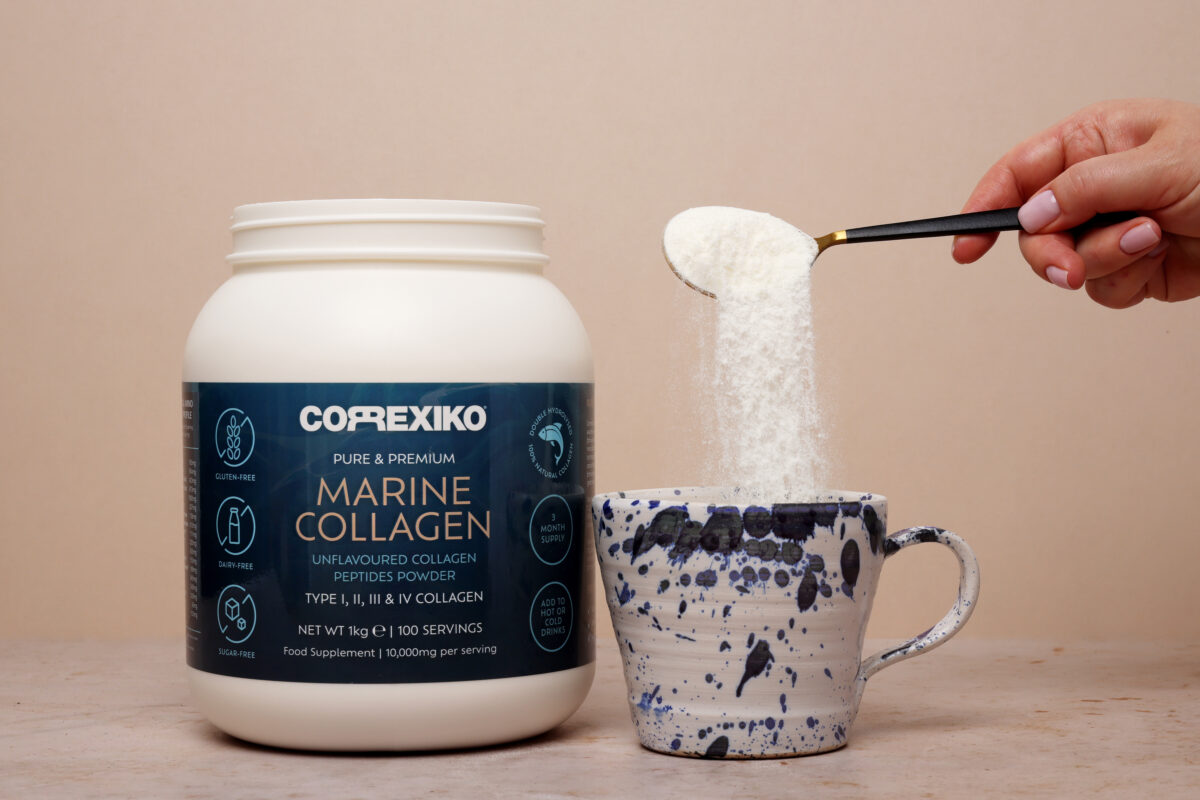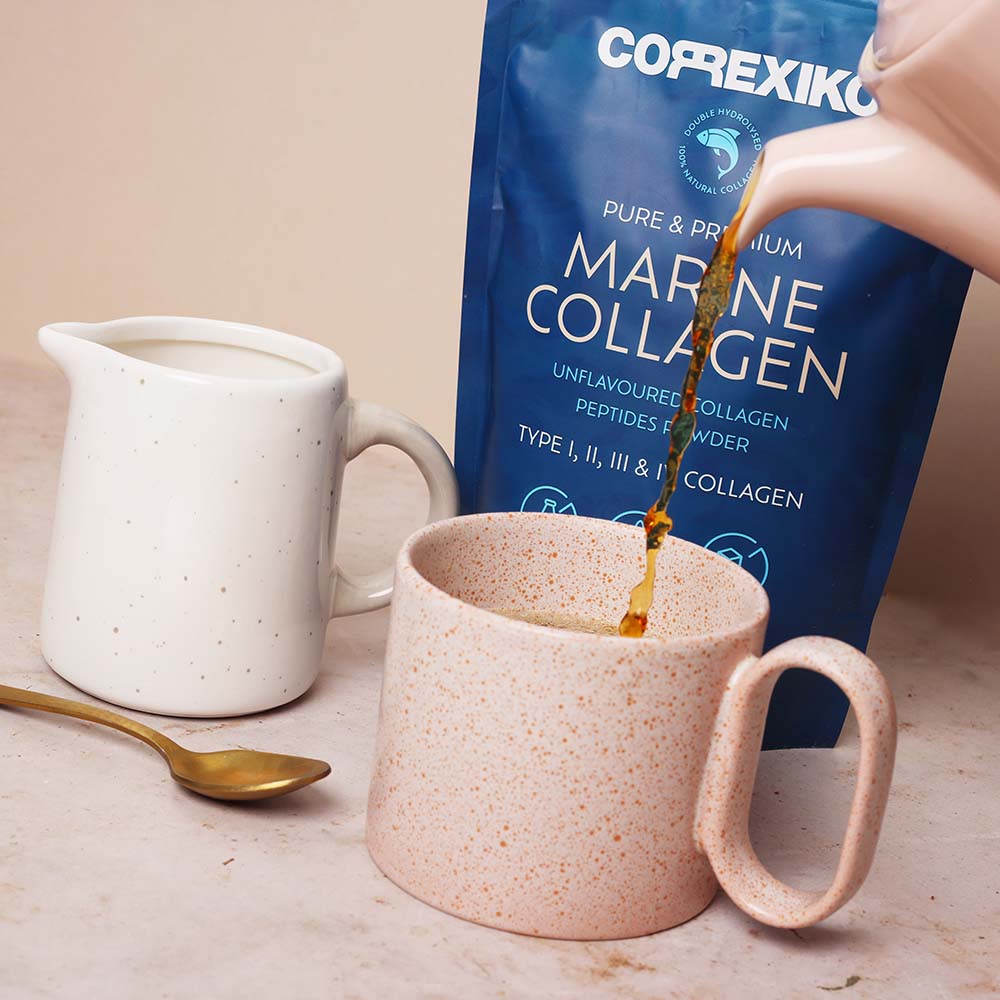Curious about collagen and its benefits? In this edition of “Ask An Expert,” we’ve gathered your most common collagen questions and enlisted Dr Dinuk Dissanayake, a former NHS specialist gastroenterologist and now founder of Correxiko, to unveil the hows, whys and whats of taking collagen. From uncovering its benefits for things like gut health and menopause to its effect on skin health and how to choose which supplement will work best for you, find out everything you need to know to boost your collagen knowledge and support your wellbeing.
What are the benefits of taking collagen?
Many visible signs of ageing, such as fine lines, wrinkles, sagging skin, dry skin, weak hair, brittle nails, joint pain, weak bones, and poor gut health, are often associated with a deficiency in collagen. While ageing is a natural process, the decline in collagen levels can be accelerated by external factors such as excessive sugar intake, alcohol consumption, smoking, and pollution. Stress and a diet high in processed foods can also contribute to collagen damage. Taking collagen peptides helps stimulate the production of new collagen, which can reverse the effects of ageing and alleviate these symptoms.
What is the difference between collagen in gummies, powder, or liquid?
Collagen supplements are available in different forms, including powder, gummies, and liquid, but the active ingredient in all of them is the same—collagen peptides. Collagen powder contains pure collagen peptides, whereas gummies and flavoured liquids often contain added sugars, synthetic flavourings, sweeteners, and artificial colouring, which may cause inflammation. Many people are now aware of ultra-processed foods, and these types of supplements could be considered ultra-processed as well. In terms of cost, gummies and flavoured liquid collagen are generally more expensive per serving than unflavoured collagen powder, with an additional cost of around 80p to £1.00 per day.

At what age should I begin taking a collagen supplement?
Collagen is essential throughout all stages of life, but its decline becomes more noticeable in our late 30s and 40s. At this stage, many people begin to notice the early signs of ageing, such as wrinkles, skin changes, and physical symptoms like joint pain, fatigue, and longer recovery times after exercise. While it’s never too late to start taking collagen, starting earlier can help build up reserves, which is particularly important for women, who lose a significant proportion of collagen during menopause. Even those in their 70s, 80s, and 90s can benefit from collagen supplements as it helps combat accelerated ageing at that stage of life.
Are there any lifestyle factors that reduce collagen production?
Yes, several lifestyle factors can negatively affect collagen production. Excessive exposure to the sun (UV radiation), smoking, alcohol consumption, and a poor diet—especially one high in sugar and low in antioxidants or protein—can lead to collagen depletion. Chronic stress, poor sleep, pollution, a sedentary lifestyle, rapid weight loss, and excessive exercise, such as endurance running, also contribute to collagen loss. Many athletes take high doses of collagen to support endurance and prevent injury.
How long does it take to see the benefits of collagen supplementation?
The timeframe for seeing results from collagen supplementation can vary depending on factors such as lifestyle, but with a high-quality collagen supplement, most people notice improvements in their skin within 1-2 weeks. Nails may strengthen within 3-4 weeks, and hair growth typically improves after 2-3 months. Internally, you may experience benefits such as reduced joint stiffness, improved mobility, stronger gut health, increased energy, and enhanced immunity over time. The longer you take collagen, the more benefits you’ll notice.
Can taking collagen help with gut health?
Yes, collagen can significantly benefit gut health. It helps strengthen the gut lining, particularly through amino acids like glutamine, which promote the regeneration of damaged tissue. This can help prevent “leaky gut,” where toxins and bacteria pass through the intestinal wall, causing chronic inflammation. Collagen peptides also have anti-inflammatory properties, reducing gut inflammation and symptoms associated with conditions like IBS. Additionally, collagen supports digestive health by enhancing stomach acid production, improving nutrient absorption, and promoting a balanced microbiome.
Can I take collagen to support perimenopause?
Yes, collagen offers many benefits during perimenopause. The drop in oestrogen levels during this time leads to decreased collagen production, which can result in thinning skin, wrinkles, and joint discomfort. Collagen supplements help restore skin elasticity, reduce joint pain, and maintain bone density, which is crucial as bone loss accelerates during perimenopause. Collagen also supports hair and nail strength, gut health, muscle mass, and even mood and sleep, making it an essential supplement during this phase of life.
Can I heat collagen?
Yes, collagen peptides are heat-stable and can be added to hot drinks or baked goods without losing their effectiveness. There’s a misconception that collagen denatures when heated, but this only applies to collagen as a protein. Collagen supplements, however, consist of collagen peptides, which remain stable when exposed to heat, allowing you to mix them into hot beverages or bake them into foods like bread, biscuits, and granola.

What does double hydrolysed mean?
Double hydrolysed collagen refers to collagen peptides that have undergone two rounds of hydrolysis, a process that breaks down collagen protein into smaller peptides. The second hydrolysis results in more uniformly smaller peptides, which are more easily absorbed and provide faster, more effective results. Compared to single hydrolysed collagen, double hydrolysed peptides offer enhanced benefits, making a 10g serving of double hydrolysed collagen more potent than the same amount of single hydrolysed collagen.
Can I take collagen long-term?
Yes, collagen is a natural protein and can be taken long-term, much like any other protein. However, it’s important to choose a high-quality product that doesn’t contain sugars, synthetic sweeteners, or additives, as these can cause chronic inflammation if consumed over time. Correxiko collagen, for example, contains pure collagen peptides from fish skin and is safe and effective for daily use to replenish collagen in the diet.
What’s the difference between taking collagen powder versus pills?
The primary difference between collagen powder and pills is the serving size. Collagen powder allows for larger servings (typically 10,000mg per serving), whereas capsules or pills only contain around 500mg of collagen each. This means that to match the effectiveness of the powder, you’d need to take around 20 capsules per day. Capsules also often contain additives, so it’s important to check the ingredient list and choose a product free from unnecessary additives.
Will collagen help my arthritis?
Yes, collagen can be beneficial for arthritis, particularly osteoarthritis, which results from the loss of bone density and cartilage. Collagen peptides support joint health by aiding in the repair and maintenance of cartilage, reducing joint pain, and improving mobility. The anti-inflammatory properties of collagen also help reduce arthritis-related inflammation, easing pain and stiffness. Regular collagen intake has been shown to help slow the progression of joint degeneration in individuals with arthritis.
What’s the difference between bovine collagen and marine collagen?
There are key differences between bovine and marine collagen. Marine collagen, derived from fish skin, is generally better absorbed by the body than bovine collagen, which comes from cattle hides and bones. The extraction process for marine collagen is gentler, using hot water and enzymes, whereas bovine collagen often requires the use of harsh chemicals. Some concerns have been raised about potential chemical residues in bovine collagen products.
Is there a suitable vegan substitute for collagen?
As collagen is derived from animal sources, there is no direct vegan equivalent. However, there are vegan supplements that can help boost the body’s natural collagen production. These often contain Vitamin C and plant-based amino acids. While these supplements are helpful, they are not as effective as animal-derived collagen, as they lack the specific peptides found in collagen, which are crucial for its benefits.
How does the body process collagen when ingested?
When you ingest collagen, your digestive system breaks it down into peptides and amino acids, which are absorbed in the small intestine and distributed throughout the body via the bloodstream. These peptides stimulate fibroblasts, the cells responsible for producing collagen, helping to repair and maintain collagen in the skin, joints, bones, and other connective tissues. As we age, collagen becomes harder to digest, which is why taking hydrolysed collagen peptides is more effective.
Can you dispel a common misconception about collagen supplementation?
A common misconception is that liquid collagen is better absorbed than collagen powder. This is untrue, as liquid collagen is simply collagen powder dissolved in liquid. The absorption rate is the same whether the collagen is in liquid or powder form.
Can I take collagen while pregnant or breastfeeding, and are there any benefits in doing so?
Collagen is a natural protein and is generally regarded as safe during pregnancy and breastfeeding, but it’s always best to consult a doctor before taking any supplement. During pregnancy, collagen can support skin elasticity, reduce the likelihood of stretch marks, promote joint and bone health, and strengthen hair and nails, which can be affected by hormonal changes. Additionally, collagen can help with gut health and muscle mass maintenance, both of which are beneficial during and after pregnancy.
For more information visit correxiko.com



